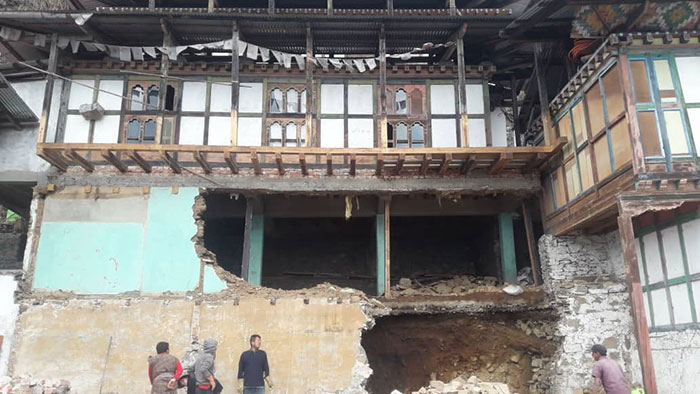Repair works of most houses yet to begin
Nim Dorji | Trongsa
Although Trongsa dzongkhag administration in collaboration with Mangdechhu project has completed the estimation of rectification and maintenance of cracks developed in Kuengarabten, the most affected houses are yet to begin repair.
Local residents complained of cracks on their homes and roads last year and blamed the project’s blasting and tunnel which passes close to the village. The project with officials from the geology and mines department conducted an investigation which reported that the cracks were not because of the project. The project authority agreed to help affected households with compensation.
On January 8, it was decided that cracks on the road and houses in Kuengarabten in Trongsa would be repaired before February 15 during a consultation meeting between the members of households and the authorities.
Without any progress, the gewog administration notified the dzongkhag administration to depute an engineer to carry out an assessment and to work out a cost estimation.
Dzongkhag administration and MHPA carried out the damage estimation of the nunnery and private residential houses.
It was learnt that repair works at the Kuengarabten nunnery began on January 29 and MHPA deputed officials to monitor the works. Repair works would cost about Nu 1.5M for the nunnery.
A house near the road, which has suffered major cracks, would be demolished and reconstruction would cost about Nu 1.9M.
However, some affected people are not aware when the repair works would start and are worried, as monsoon is nearing.
A resident said that officials come to inspect every five to 10 days but they are not informed on when the repair works would begin. “We heard estimation of two affected houses are complete and one has started the work, but when we ask about ours, officials say that the cracks are small and the soil should be stabilised.”
MHPA would be funding more than 4 million (M) to repair and rectify the affected houses.
MHPA’s joint managing director, Chencho Tshering, said most of the major works are works are completed and the fund is also ready. “Everything will be completed in two to three weeks.”
He said funds would be released once the works start.
It was learnt that cracks on the ground would be filled using compaction to avoid water seepage. A team was also deployed to check soil movements and sensors are being used in some houses near the road to check vibration.


